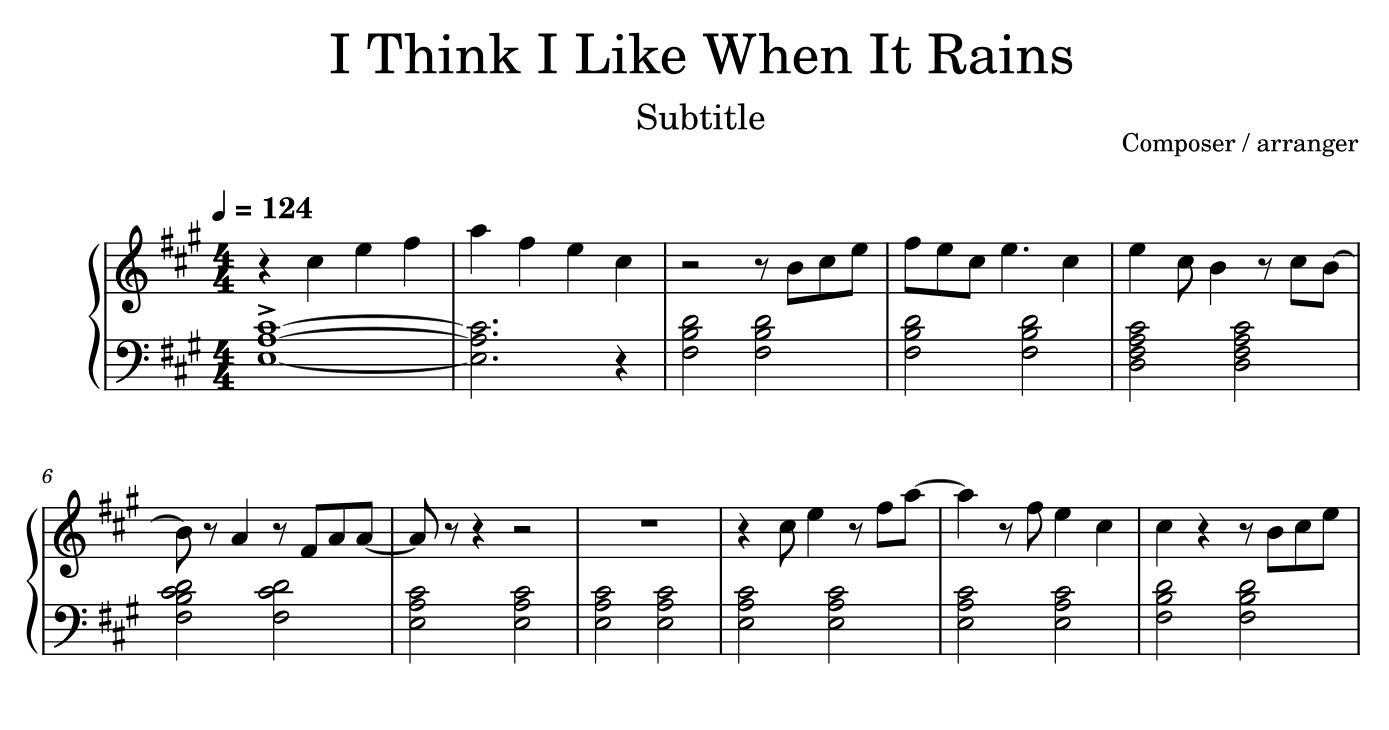

Rock
Why Do I Like Rock Music
Modified: February 15, 2024
Discover the reasons why rock music captivates the hearts of millions. Explore the irresistible allure of the rock genre and the emotions it evokes.
(Many of the links in this article redirect to a specific reviewed product. Your purchase of these products through affiliate links helps to generate commission for AudioLover.com, at no extra cost. Learn more)
Table of Contents
Introduction
Rock music has long captivated audiences around the world with its powerful sounds and rebellious spirit. From its roots in the mid-20th century to its enduring popularity today, rock music has become more than just a genre – it has become a cultural phenomenon. For many people, rock music is not just a form of entertainment; it’s a way of life.
So, what is it about rock music that makes it so appealing? Is it the loud guitars, energetic drumming, or the passionate lyrics? Or is it the sense of rebellion and freedom that often accompanies the genre? While the reasons may vary from person to person, there is no denying the emotional connection that rock music elicits.
Throughout its history, rock music has evolved and diversified, giving rise to various subgenres such as classic rock, punk rock, alternative rock, and heavy metal. Each subgenre has its own unique characteristics and fan base, attracting individuals with different musical tastes and preferences.
In this article, we will delve into the world of rock music and explore why so many people are drawn to its electrifying sound. We will examine the historical origins of rock music, discuss its defining characteristics, and delve into the emotional connection that fans have with the genre. Additionally, we will explore the influence of rock music on society, the personal preferences and reasons for liking rock music, and the psychological effects of listening to this genre. Join us on this musical journey as we explore the fascinating world of rock music and uncover the reasons behind its enduring appeal.
Historical Origins of Rock Music
The roots of rock music can be traced back to the blues, gospel, and rhythm and blues (R&B) music that emerged in the early 20th century. In the 1950s, a new wave of musicians began experimenting with these genres, combining elements of rhythm and blues with a heavier emphasis on electric guitars and a more energetic sound.
One pivotal moment in the history of rock music was the rise of artists such as Elvis Presley, Chuck Berry, and Little Richard. With their electrifying performances and catchy songs, they brought rock music to a mainstream audience. These musicians were known for their energetic stage presence, rebellious attitudes, and innovative use of guitars.
Another significant development in the evolution of rock music was the British Invasion of the 1960s. British bands like The Beatles, The Rolling Stones, and The Who gained immense popularity in the United States, introducing a new sound and style that greatly influenced the direction of rock music. The Beatles, in particular, were known for their experimentation with different musical styles and pushing the boundaries of what rock music could be.
As the 1970s dawned, rock music continued to evolve, giving rise to subgenres such as glam rock, progressive rock, and punk rock. Bands like Led Zeppelin, Queen, Pink Floyd, and the Sex Pistols pushed the boundaries of rock music even further, experimenting with unique sounds, complex arrangements, and socially conscious lyrics.
In the 1980s and 1990s, rock music underwent further transformations, with the emergence of subgenres like alternative rock, grunge, and nu-metal. Bands like Nirvana, Pearl Jam, and Metallica captured the attention of a new generation with their raw and gritty sound.
Today, rock music continues to evolve and remains a vibrant force in the music industry. From classic rock acts like AC/DC and Guns N’ Roses to modern rock bands like Foo Fighters and Arctic Monkeys, the genre continues to attract new listeners and inspire a whole new generation of musicians.
The historical origins of rock music play a crucial role in its enduring popularity. From its humble beginnings in the blues and R&B of the 20th century to its current diverse subgenres, rock music has continuously evolved and reinvented itself, leaving an indelible mark on the music landscape.
Characteristics of Rock Music
Rock music is characterized by a distinctive set of traits that distinguish it from other genres. From its energetic beats to its raw and expressive lyrics, rock music has a sound and style that is instantly recognizable.
One of the defining characteristics of rock music is the prominent use of guitars. Whether it’s the driving power chords or the intricate soloing, guitars take center stage in rock music. From the melodic riffs of Jimi Hendrix to the blistering solos of Eddie Van Halen, the guitar serves as the backbone of the genre.
Another key characteristic of rock music is its rhythm and beat. Rock songs often feature a strong and steady drumming pattern that provides a powerful and driving momentum to the music. The combination of drums and bass guitar creates a solid foundation for the other instruments to build upon.
Dynamic and emotive vocals are also a hallmark of rock music. Whether it’s the raw and edgy voice of Mick Jagger or the soaring melodies of Freddie Mercury, rock vocalists have the ability to convey a wide range of emotions and connect with audiences on a visceral level.
The lyrical themes in rock music are diverse, covering a wide range of topics including love, rebellion, social issues, and personal struggles. Rock lyrics often express a sense of defiance and independence, reflecting the rebellious nature of the genre.
Rock music is also known for its high-energy and electrifying performances. From the energetic stage presence of artists like Bruce Springsteen and Tina Turner to the elaborate and theatrical shows of bands like Kiss and Queen, rock musicians excel in creating an immersive and captivating live experience.
Furthermore, rock music is characterized by its versatility and ability to evolve. From the blues-based rock of the 1950s to the progressive rock of the 1970s and the alternative and indie rock of the 1990s, the genre has constantly adapted and incorporated influences from other musical styles.
In summary, the characteristics of rock music include the prominent use of guitars, driving rhythms, emotive vocals, diverse lyrical themes, high-energy performances, and a penchant for evolution. It is these distinct qualities that make rock music a powerful and enduring genre that continues to captivate listeners around the world.
Emotional Connection to Rock Music
Rock music has a unique ability to forge a deep emotional connection with its listeners. It has the power to evoke strong emotions, trigger memories, and create a sense of catharsis. Whether it’s through the raw energy of the music, the heartfelt lyrics, or the relatable themes, rock music has a way of resonating with people on a profound level.
One reason for the emotional connection to rock music is its ability to provide an outlet for expression and release. The intense and passionate nature of the music allows listeners to channel their own emotions and find solace in the music. Whether it’s anger, sadness, or excitement, rock music can provide a cathartic release for pent-up feelings.
Moreover, the lyrics of rock songs often delve into universal and relatable themes. From love and heartbreak to social issues and personal struggles, rock music addresses the human experience in a way that many listeners can identify with. Songs like “Stairway to Heaven” by Led Zeppelin or “Imagine” by John Lennon have the power to move and inspire listeners, creating a profound emotional connection.
Rock music also has the ability to transport listeners to a different time or place. The nostalgic power of certain songs can evoke memories and emotions associated with specific moments in one’s life. Hearing a favorite rock song from the past can instantly transport a listener back to a cherished memory or a significant period of their life.
In addition, the energetic and powerful nature of rock music can elicit a sense of empowerment and liberation. The driving guitars, thunderous drums, and soaring vocals can create a feeling of invigoration and freedom. This emotional connection to the music can be especially powerful during live performances, where the communal experience of a rock concert amplifies these emotions.
Furthermore, the rebellious spirit and counterculture image often associated with rock music can foster a sense of identity and belonging. Many individuals find solace and a sense of community in the rock music subcultures, where they can connect with like-minded fans and find acceptance and understanding.
Overall, the emotional connection to rock music is multifaceted. Whether it’s the release of emotions, the relatable lyrics, the transportive power, the sense of empowerment, or the feeling of belonging, rock music has a way of deeply resonating with listeners on an emotional level. It has the ability to provide solace, inspiration, and a profound sense of connection that transcends language and cultural barriers.
Influence of Rock Music on Society
Rock music has had a profound impact on society, shaping culture, influencing fashion, and challenging societal norms. From the rebellious attitudes of the 1960s to the subversive lyrics of punk rock, rock music has served as a catalyst for social change and a voice for the marginalized.
One significant way that rock music has influenced society is through its role in challenging authority and traditional values. The countercultural movements of the 1960s, symbolized by the likes of Bob Dylan and the Woodstock Festival, rejected mainstream ideals and embraced peace, love, and social justice. Rock music became a rallying cry for civil rights, anti-war protests, and calls for social equality.
In the 1970s, punk rock emerged as a reaction to the perceived excesses of mainstream rock music. With bands like the Sex Pistols and The Clash leading the way, punk rock embraced a DIY ethos and an anti-establishment attitude. It served as a critique of societal norms, consumerism, and political corruption.
Beyond its social influence, rock music has also played a significant role in shaping popular culture. From iconic album covers to memorable music videos, rock music has paved the way for innovative and visually striking artistic expressions. Bands like The Beatles and Led Zeppelin revolutionized album cover art, creating visual identities that became as iconic as their music. Likewise, music videos from artists such as Michael Jackson and Queen pushed the boundaries of storytelling and visual effects, shaping the future of music videos as an art form.
Rock music has also had a profound impact on fashion, influencing trends and styles throughout the decades. The rebellious and edgy image of rock musicians has inspired countless fashion statements, from leather jackets and ripped jeans to band t-shirts and androgynous looks. The aesthetics of rock music have permeated popular culture, making an indelible mark on fashion runways and street styles worldwide.
Moreover, the commercial success of rock music has created a significant economic impact. From the rise of global music festivals to the growth of record labels and merchandise sales, rock music has fueled an entire industry. The success of rock bands and concerts generates revenue, employment, and tourism opportunities, contributing to local economies and the entertainment sector at large.
In summary, the influence of rock music on society is far-reaching. It has challenged authority, shaped popular culture, influenced fashion, and fueled economic growth. By giving a voice to the marginalized, sparking social movements, and pushing artistic boundaries, rock music continues to make an enduring impact on society, captivating and empowering generations of listeners.
Personal Preferences and Reasons for Liking Rock Music
People have diverse tastes when it comes to music, and for many, rock music holds a special place in their hearts. The reasons for liking rock music can vary from person to person, but there are several common factors that contribute to its appeal.
One reason individuals are drawn to rock music is the emotional connection it provides. Rock songs often have powerful and relatable lyrics that speak to the human experience. Whether it’s a love song that captures the depths of emotion or a rebellious anthem that channels a sense of defiance, rock music can resonate with listeners on a deep and personal level.
Furthermore, the energetic and dynamic nature of rock music is a magnet for those seeking an adrenaline rush. The intense guitar riffs, thunderous drumming, and high-octane performances create a sense of excitement and energy that can be both invigorating and cathartic.
Many rock music fans also appreciate the technical skills and musicianship displayed by rock artists. The intricate guitar solos, complex drum patterns, and powerful vocals showcase the talent and craftsmanship of the musicians. The musicianship and virtuosity displayed in rock music can be awe-inspiring and leave a lasting impression on listeners.
Rock music has also been associated with a sense of rebellion and non-conformity. Many individuals are drawn to the genre’s countercultural ethos and embrace its anti-establishment attitude. Rock music has often been a voice for those who feel marginalized or misunderstood, providing a sense of identity and solidarity.
Moreover, the diversity within the rock genre allows listeners to find their niche and align with a particular subculture. Whether it’s classic rock, alternative rock, or heavy metal, each subgenre has its dedicated fan base and community. This sense of belonging and shared interest can create a strong sense of camaraderie and connection among rock music enthusiasts.
Lastly, nostalgia plays a significant role in people’s affinity for rock music. Many individuals develop an attachment to certain songs or bands during their formative years, and those memories and emotions become intertwined with the music. This nostalgia factor can create a longing for the music of the past and a desire to relive those cherished moments.
In summary, personal preferences for rock music are diverse and multifaceted. The emotional connection, adrenaline-inducing nature, appreciation for musicianship, sense of rebellion, sense of belonging, and nostalgic associations are all factors that contribute to the appeal of rock music. Whether it’s the lyrical content, the energetic performances, or the sense of community, rock music continues to captivate and resonate with listeners around the globe.
Psychological Effects of Listening to Rock Music
Listening to rock music can have profound psychological effects on individuals, influencing mood, cognition, and overall mental well-being. The powerful and emotive nature of rock music can evoke a range of emotions, stimulate the mind, and provide a sense of catharsis.
One significant psychological effect of listening to rock music is its ability to alleviate stress and improve mood. Research has shown that listening to music, including rock music, can help reduce anxiety levels and enhance feelings of relaxation and pleasure. The energetic and rhythmic qualities of rock music can have an uplifting effect, boosting mood and providing an escape from daily stressors.
Rock music has also been found to increase motivation and enhance cognitive performance. The fast tempo and driving beat can lead to increased arousal and alertness, helping individuals feel more focused and engaged. This heightened state of cognitive activation can be beneficial for tasks that require concentration and productivity, such as studying or working on projects.
Moreover, rock music has been known to inspire creativity and imagination. The evocative lyrics, powerful melodies, and intricate compositions can stimulate the mind and encourage divergent thinking. Many artists and writers find inspiration in rock music, using it as a catalyst for new ideas and a means of self-expression.
Another psychological effect of listening to rock music is the sense of empowerment and identification it can foster. The rebellious and defiant nature of rock lyrics and imagery can resonate with individuals who may feel marginalized or misunderstood. Listening to rock music can provide a sense of connection and empowerment, allowing listeners to express their own emotions and perspectives.
Furthermore, rock music can serve as a form of emotional release and catharsis. The intense and emotive lyrics, coupled with the energetic instrumentation, can help individuals express and process their own feelings of anger, sadness, or frustration. This emotional release can be therapeutic, allowing individuals to find solace and understanding through the music.
In addition, rock music has the potential to create a sense of nostalgia and evoke vivid memories. Certain songs or albums may be associated with significant moments or periods in one’s life, triggering a flood of memories and emotions. This nostalgic effect can be comforting and provide a sense of connection to the past.
In summary, listening to rock music has numerous psychological effects, including stress relief, mood enhancement, increased motivation, enhanced creativity, empowerment, emotional release, and nostalgia. The combination of powerful lyrics, energetic instrumentals, and personal associations can elicit powerful emotional responses and contribute to overall psychological well-being.
Rock Music as a Form of Self-Expression
Rock music has long been celebrated as a powerful form of self-expression, allowing individuals to convey their thoughts, emotions, and identities in a raw and authentic way. Through the lyrics, instrumentation, and performance, rock music provides a platform for artists and listeners alike to express their individuality and connect with others on a deep level.
One of the key ways in which rock music serves as a form of self-expression is through the lyrics. Rock songs often address personal experiences, social issues, and profound emotions, providing a means for artists to share their innermost thoughts and connect with listeners who may relate to their words. By expressing their own experiences and perspectives, rock musicians can create a sense of connection and understanding among their audience.
The instrumentation in rock music also serves as a powerful tool for self-expression. From the driving power chords to the intricate guitar solos, the musicians themselves are able to express their emotions and convey their unique style through their instrument. The music becomes an extension of themselves, allowing them to communicate and connect with others in a universal language.
Furthermore, rock music allows individuals to explore different facets of their identity and challenge societal norms. Many rock musicians have used the genre as a platform to push boundaries, question authority, and challenge the status quo. From the gender-bending performances of David Bowie to the revolutionary spirit of punk rock, rock music has provided a space for individuals to express their individuality and challenge social conventions.
For listeners, rock music serves as a form of identification and self-discovery. Many fans find solace and a sense of belonging in the music and the subcultures associated with it. The music becomes a reflection of their own experiences, emotions, and values, providing a sense of connection and validation.
In addition, rock music allows individuals to cultivate and project their own personal image and style. The distinct aesthetics of different rock genres, whether it’s the leather-clad rockers of classic rock or the angst-ridden grunge scene of the 90s, provide a visual language for self-expression. Rock music has influenced fashion, hairstyle trends, and even lifestyle choices, allowing individuals to embody their favorite artists and make a statement about who they are.
Moreover, rock music facilitates a sense of individuality and self-empowerment. Many fans find inspiration and strength in the music to overcome challenges and pursue their passions. The anthems of resilience and the messages of self-empowerment in rock music can serve as a source of motivation and encouragement.
Overall, rock music embodies the spirit of self-expression, allowing artists and listeners alike to convey their thoughts, emotions, and identities in a powerful and authentic way. Whether it’s through the lyrics, instrumentation, fashion choices, or the sense of community, rock music provides a means for individuals to express their individuality, challenge societal norms, and connect with others who share their experiences and values.
Conclusion
Rock music, with its rich history and diverse subgenres, has left an indelible mark on the music industry and society as a whole. From its origins in the blues and R&B to the rebellious and boundary-pushing sounds of punk rock and alternative rock, rock music continues to captivate audiences around the world.
Throughout this article, we have explored various aspects of rock music, including its historical origins, defining characteristics, emotional connection, societal influence, personal preferences, psychological effects, and its role as a form of self-expression. We have delved into the power of rock music to evoke emotions, provide an outlet for expression, and foster a sense of belonging and empowerment.
The emotional and energetic qualities of rock music allow listeners to connect on a personal and profound level, finding solace, inspiration, and even catharsis in the music. Rock music’s influence extends beyond the realm of entertainment, as it has played a significant role in shaping popular culture, fashion, and even social movements.
Listeners are drawn to rock music for various reasons, whether it’s the relatable lyrics, the driving rhythms, the exceptional musicianship, the rebellious spirit, or the nostalgic associations tied to the music. It serves as a means of self-expression, providing a voice for those who feel marginalized and a platform for artists to share their deepest thoughts and emotions.
Furthermore, rock music has psychological effects, such as stress relief, mood enhancement, cognitive stimulation, and creative inspiration. Its powerful influence can uplift spirits, motivate individuals, and unlock creative potential.
In conclusion, rock music has a timeless allure and enduring appeal that transcends generations and cultures. It has the power to bridge differences, foster connections, and ignite passion. Whether you’re headbanging to metal, swaying to classic rock, or immersing yourself in alternative sounds, rock music continues to resonate with the human spirit, providing a powerful outlet for self-expression and a soundtrack to the memories and emotions of our lives.











